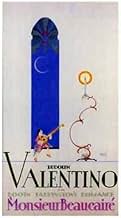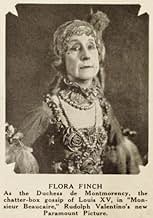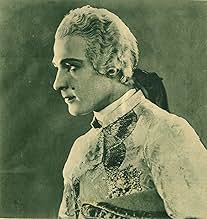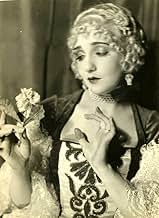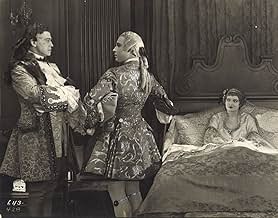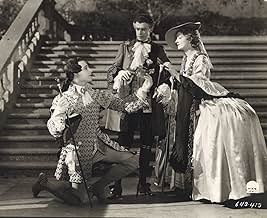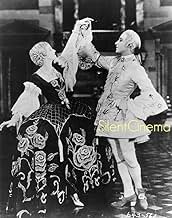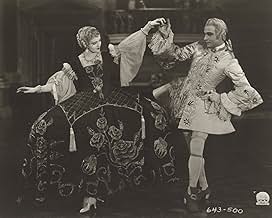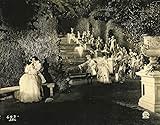Ajouter une intrigue dans votre langueWhen M. Beaucaire, a handsome barber, catches the Duke of Winterset cheating at gambling, Beaucaire exacts Winterset's cooperation in sneaking Beaucaire into a great ball, disguised as the D... Tout lireWhen M. Beaucaire, a handsome barber, catches the Duke of Winterset cheating at gambling, Beaucaire exacts Winterset's cooperation in sneaking Beaucaire into a great ball, disguised as the Duke de Chartres, and to introduce him to the beautiful Lady Mary. The disguised barber suc... Tout lireWhen M. Beaucaire, a handsome barber, catches the Duke of Winterset cheating at gambling, Beaucaire exacts Winterset's cooperation in sneaking Beaucaire into a great ball, disguised as the Duke de Chartres, and to introduce him to the beautiful Lady Mary. The disguised barber successfully pulls off the masquerade and is soon the toast of society. But Winterset is embi... Tout lire
- Prix
- 3 victoires au total
Avis en vedette
On the brighter side, cinematographer Harry Fischbeck does a nice job of imbuing the sets with the right amount of light & shadow. Not knowing if the scenes were originally tinted & toned, the b/w LOC print was superb with constant projection speed indicating the film was probably photographed at 24 fps. It's fortunate that a marvelous print survives to showcase Fischbeck's efforts. Valentino, powder puff or not, is amusing & subdued in a costume picture that really isn't way over his head. He displays a nice bit of tongue & cheek wonderfully pantomimed by the actor. A really good scene, and one repeated on television, has Valentino leaping over a balcony with sword at his side into the darkness. One can see why documentists would use that scene because it is well done. Other scenes are photographed so crisp and in closeup that lip readers can have a field day 'hearing' what the actors are saying. Indeed Olcott improved in close-ups more here than he had in LONY but Beaucaire is still pedestrian and wont come alive. Legend has it that Natacha Rambova, Valentino's wife, interferred with direction on this film and caused trouble all during the shooting but Olcott's vane directing style is in evidence throughout. Booth Tarkington's novel is a historical-costume-comedy-drama that delves away from the usual slice of Americana he usually put out such as THE MAGNIFICENT AMBERSONS. Valentino fans will have no problem seeing their hero in royal powdered attire. His pleasant appeal still comes through despite Olcott. Valentino will give a similar devil may care performance a year later in THE EAGLE directed by Clarence Brown. Brown, like Vidor & Crosland, was one of a new crop of directors who were soon to adapt the moving camera and almost make it an unassuming character within the story it was filming. Lastly Monsieur Beaucaire has all the right productions(A-List), excellent photography, and probably a decent musical score when it debuted but Sidney Olcott's static is ingrained in the picture. With another newer younger director this picture could've moved and consequently could've ended up being better remembered if not a late silent classic.
That said, it can't be denied that much of the film, particularly the beginning, is slow moving and static: sumptuous costumes and sets seem to have replaced dramatic action (The Sheik may have been inauthentic and schlocky, but at least it moved). I believe the film also suffers from its lack of a strong, or at least charismatic and likable leading lady for Valentino to spar with and courta serious flaw in a romance. Princess Henriette (Bebe Daniels has been far more appealing elsewhere) and Lady Mary are virtually indistinguishable: spoiled and sullen, they recall the upper class fiancé Valentino was only too happy to be rid of in "Moran of the Lady Letty" far more than the memorable female leads of "The Four Horsemen of the Apocalypse," "Blood and Sand," "The Eagle" and the sheik movies.
Not an unmitigated disaster by any means, but Valentino has certainly done better work elsewhere.
This is a really good film, but it's direction by Sidney Olcott is far too rooted in trying to capture the mannerisms of good manners of the time of Louis XV of France (1710-1774). As a result, the film drags in many places, especially at the beginning. Also, the character development is very lopsided, and in some cases doesn't get done. Either that, or a lot of cutting was done to make the finished product from what was originally there. Lowell Sherman plays Louis XV, and of course he's excellent, but his part is barely there. His queen is Lois Wilson, and she's perhaps in four scenes, if that. The part of Bebe Daniels - the important female of the piece - begins with great importance and ends with great importance, but during the large middle is not even there... The best female in the piece is Doris Kenyon. For a while, I thought she was going to be the end love of Rudy, but, no, that couldn't be, shouldn't be - and wasn't... The entire film, however, IS centered around Valentino. He's actually quite good. He plays the Prince Bourbon, Duke de Chartres who, due to circumstances, pretends to be a barber. He practices his skills at such while fleeing France and "hiding" in England. People have jested when he shaves himself rather than letting someone else do the trick. In his class nobody male shaves himself! Anyway, throw in the many loves and affairs, including Madame Pompadour, and you've got a pretty good story. The film is sumptuous, though it is VERY stage bound in its sets, causing it to be somewhat claustrophobic. It also uses far too many iris shots, causing it to be even more claustrophobic. Plus, the lighting is such that the lights follow the characters in the action, but many times allow all surroundings to be rather dark. The film, frankly, is too dark overall. Still, the costuming and sumptuousness of all the rest is lovely.
Overall, I have very mixed feelings about this one. I loved it from the second half onward to the end. I almost didn't want to get into the piece at the beginning, though. Stay with it and you'll be pleased by the end. Valentino and all the actors and actresses are quite good. The faults of the film aren't theirs. Yes, it's worth your time now that you've been pre-prepared...
After a two year strike, Rudolph Valentino made "Monsieur Beaucaire" his comeback film. It's an elaborate, confusing, and mannered production. Nevertheless, in Valentino's case, absence did make the hearts of America grow fonder; and, Valentino spent the next two years as the USA's top male Box Office Star. Probably, the position was enhanced due to the continued circulation of the star's previous hits.
"Monsieur Beaucaire" is a valiant failure. Staid, light and shadow direction by Sidney Olcott, daintily made-up and costumed players, and elaborately designed scenes are featured. The story of a royal assuming the commoner's role is interesting; but, despite the title, Valentino is only briefly seen in the entertaining role of barber. Possibly, the film's focus was lost during the making.
One of Valentino's 1923 song recordings was added to the soundtrack; listen for it when the star sings a serenade, near the film's beginning. A record wasn't released until later, but the song is chronologically correct, herein; thematically, the Valentino recordings more closely fit other films, however. This recording, and Valentino's successful American tour, suggested a Garbo-like success in talking films was possible, had Valentino lived into the sound era.
***** Monsieur Beaucaire (8/11/24) Sidney Olcott ~ Rudolph Valentino, Bebe Daniels, Lois Wilson
Le saviez-vous
- AnecdotesBebe Daniels later recalled that the cast was required to recite all their dialog in French.
- ConnexionsFeatured in Blue Skies (1946)
Meilleurs choix
Détails
Box-office
- Brut – États-Unis et Canada
- 556 826 $ US
- Durée
- 1h 46m(106 min)
- Mixage
- Rapport de forme
- 1.33 : 1

